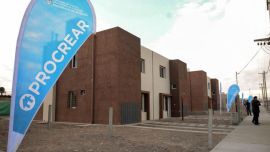Opposition lawmakers in the lower house Chamber of Deputies released a statement Wednesday expressing their "profound repudiation of the coup perpetrated in Bolivia." Their Cambiemos/Juntos por el Cambio counterparts were a bit more tempered with their words, though their statement did reject the "reprehensible police and military interventions" in the troubled Andean nation.
Government-aligned lawmakers sent their statement to the floor Wednesday morning. It was signed by the chief of the bloc Mario Negri (UCR-Radicals), Álvaro González (PRO) and Juan Manuel López (Civic Coalition-ARI), with each signatory representing the three main strands of the ruling coalition. The process will be replicated within the Upper House of the Chamber of the Senate.
The text ratified commitments to "the Democratic Claus of the OAS [Organisation of American States] and the Ushuaia Protocol of Mercosur [trade bloc]" as well as condemning "attacks against the democratic system" in Bolivia which, the text states, include interventions by the Armed Forces and electoral fraud carried out by those who oversaw the elections. Rejecting threats to democracy, the coalition's statement called for respect of "constitutional authorities" and the "immediate re-establishment" of norms that would "guarantee peace" and bring "elections with total transparency."
Another area of distinction between the positions taken by the opposition and oficialismo lies in the culpability of Evo Morales, the now former president of Bolivia who has sought asylum in Mexico. For its part, government lawmakers pointed out Morales took a series of actions that justified the protests that assisted his exit from government.
To the contrary, the opposition's statement failed to ascribe any responsibility to the Morales' government. It adds that the call for new elections should take place without any imposed conditions, a reference to rumours that should new elections take place, the leftist party of Morales, MAS (Movement to Socialism) would be excluded.
Finally, the opposition extolled the region and called for change to the entire political arc of Latin America. It demanded the immediate end of the "persecution and violation of human rights of government officials, party leaders, unions, social movement leaders, feminists and the population in general."
– NA/TIMES



















Comments